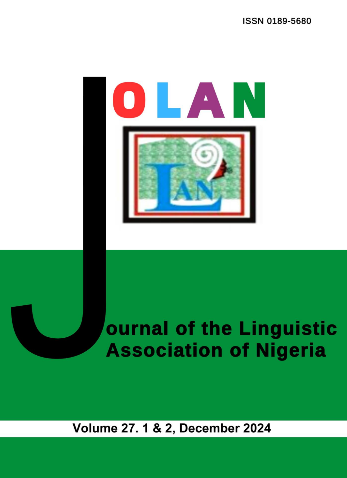A Study on the Form, Structure and Functions of Igbo Work Songs
Keywords:
Song, work song, form, structure and functionsAbstract
The study examines Igbo work songs to identify their forms, efficiency and roles in the Igbo society. In recent times, globalization seems to have made so much inroads into Africa and its culture as to relegate traditional lore, indigenous mores and values to the background. This paper therefore: aims at documenting Igbo work songs in a bid to identify and preserving Igbo: work songs so that future generation will benefit from them. The paper is premised on functionalism theory which has its mayor assumption that literatures is and naught to be relevant to the society that has given birth to it as well as nurture it. Data for study were collected from Afikpo in Ebonyi state, Nsukka in Enugu state, Onitsha in Anambra state and lmo state. The study used interview and participant observation methods. An unstructured self-administered questionnaire was used for one category of respondents who were thought knowledgeable enough about Igbo work songs. The data collected using electronic devices were transcribed and translated from Igbo to English. The literal and deep structure meanings were carefully analysed by using an elderly Igbo speaker as an informant. Data were further evaluated and triangulated according to themes that emerged, by employing narrative method. The major findings of the study reveal that joint singing of work songs coordinates the action and leads the workers to feel and work as a co-operating group, not as separate individuals. The rhythm of the song encourages the people to work harder, faster, and with more enjoyment. Furthermore, the findings of the study reveals that some of the work songs comment on life in general, on local events and express ideas of love and friendship and thus lighten the labour and give an opportunity for poetic expression in the midst of work.
References
Chesaina, C.(1997). Oral literature of the Embu and Mbeere. Nairobi: East African Educational Publishers.
Contextual Studies of Oromo Oral Literature in Contemporary Perspective. Ph.D
Davy, D. (1995). Investigating English Style. London: Macmillan Press.
Derrida, J. (1978). Writing and Differences: Transbrain Massuani. Minneapolis: University of Minneasota Press.
Dissertation, Institut Litteratur, Kultar Og Medier, Syddansk Universitet.
Durheim, E. (1917). Verbal art as performance. American Anthropologist, 77, 8-11.
Finnegan, R. (1970). Oral Literature in Africa. Oxford: Oxford University Press.
Finnegan, R. (1977). Oral Poetry, Its Nature, Significance and Social Context. London: Cambridge University Press.
Gemeda, E. (2008).African Egalitarian Values and Indigenous Genres: The Functional and Goldschmidt,
W. (1986). Comparative Functionalism: An Essay in Anthropological Theory. Berkeley: University if Carlifornia Press.
Holman, G. H. (1980)- A Handbook of Literature. New York: The Odessey Press.
Jacobson, R. (1974). Russian Formulation. London: Mounton.
Kennedy, M (1994).Song: The Oxford dictionary of music (2nd ed.) Oxford: Oxford University Press.
Koelb, I (1988). Bantu riddles and their significance. Bantu Studies, 6, 215-232.
Mbah, B. M and Mbah, E. E. (2007).Azuonye Lectures on Igbo Oral Literature and Stylistics: Nsukka: University of Nigeria Press Limited.
Miruka, O. (2001). Oral Literature of the Luo. Nairobi: East African Educational Publishers. Modern Education Review. 4 (4), 304-310.
Mtsheli, Z.(1991).A literary analysis of nuptial song among the Mankon people of North West Province of Cameroon. M.A. Dissertation. Department of English. E N S.Yaounde.
Nketia, J. H. (1962). African Music in Ghana. London: William Cloves and Sons Limited.
Nnamani, N. S. (2014). The Role of Folk Music in Traditional African Society. Journal of Modern Education Review 4(4), 304-310
Offor, N. K. (2008). Documentation and Analysis of Selected Folksongs from Anaocha Local Government Area of Anambra State. M. A. Dissertation. Department of Music, University of Nigeria,
Nsukka.
Philadelphia Webster’s Universal Dictionary and Thesauraus (2006). Scotland: David Dale House.
Porter, G. (1992). The English Occupational Song. M. A. Dissertation. Department of English, University Umea, Sweden.
Schechner, R. (1982). Collective Reflexivity: Restoration of Behaviour in J. A. Ruby (Ed.)Crack In The Mirrior: Reflexive Perspective in Anthropology. (Pp12-14). Philadelphia:














